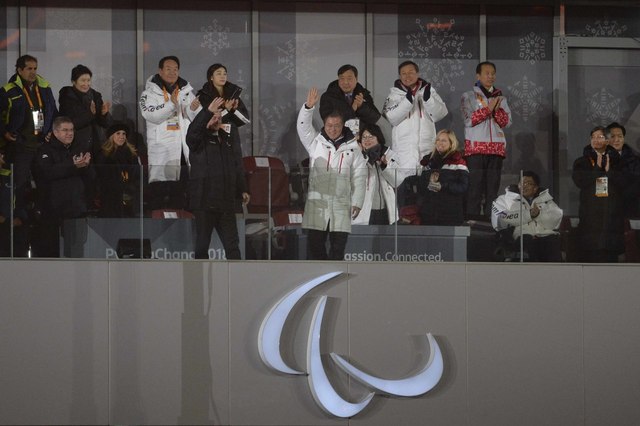 |
|
President Moon Jae-in waves to the crowd during the opening ceremony of the Pyeongchang Paralympics on Mar. 9. (Photo Pool)
|
The South Korean leader cannot rest easy until peace on the Korean Peninsula is assured
President Moon Jae-in offered a somewhat muted response to the good news from Washington on Mar. 9 about plans for a North Korea-US summit. In a position statement on the North Korea-US talks announced by Blue House spokesperson Kim Eui-kyum, Moon said the meeting between North Korean leader Kim Jong-un and US President Donald Trump will “go down as a historic milestone in creating peace on the Korean Peninsula.” “I express my deep thanks to the courage and wisdom of the two leaders in making this difficult decision,” he added. While Moon’s mediating efforts as self-appointed “driver of the Korean Peninsula” played a major role in the formation of North Korean summits with the South in April and now the US in May, the Blue House maintained a cautious stance, stressing that “what happens from now on is more important.” Moon’s attitude is that he cannot afford to rest easy until the hard-won momentum in dialogue leads ultimately to denuclearization and peace for the Korean Peninsula. “It’s the kind of feeling where you’re worried it might fly away if you blow too hard or crumble if you squeeze too hard,” Kim Eui-kyum told reporters. “When there’s another party involved, you have to be all the more careful.” The idea of the North Korean and US leaders sitting down as the principal actors in the North Korean nuclear issue seemed unimaginable just 100 days ago, when predictions of war were swirling around the Korean Peninsula. In and around the Blue House, the assessment is that Moon’s role in consistently stressing South Korea-US cooperation and dialogue with the North since taking office last May has played a large part. Even when visiting North Korean special envoy Kim Yo-jong shared Kim Jong-un’s proposal for an inter-Korean summit during a visit on Feb. 10, Moon approached the matter cautiously, suggesting the two sides “form the right conditions” to achieve it. Now that agreements to meet have been secured from the North Korean and US leaders, Moon faces the task of directing or mediating the process so that the inter-Korean and North Korea-US summits yield practical results toward the peninsula’s denuclearization. A number of misfires have occurred in the past; in 2000, a summit that seemed likely to happen between then-North Korean leader Kim Jong-il and Bill Clinton failed to transpire. While hopes are already high for Trump and Kim Jong-un sitting down in person for a conversation – rather than simply “exploratory dialogue” or “words for words and actions for actions” – as new figures facing new conditions with advancements in the North’s nuclear weapons, previously unexperienced variables could wind up surfacing. For that reason, Moon plans to set up a hotline with Kim and carry on working-level discussions toward the inter-Korean summit to continue the climate of dialogue and interchange. With the US, he plans to work to sustain the atmosphere and prevent Washington from reversing itself on its willingness to talk to Pyongyang. Moon working to secure support and cooperation from China, Japan, and Russia Moon also appears likely to focus on winning strong support and cooperation from the other countries involved, including China, Japan, and Russia. His aim is ultimately to have all six of parties to the Six-Party Talks on the North Korean nuclear issue – South and North Korea, the US, China, Japan, and Russia – moving in the same direction. “President Moon’s sights are set on restoring the Six-Party Talks, with a basic approach of two inter-Korean and North Korea-US tracks,” a key Blue House official said. The goal is to use the Six-Party Talks framework to establish denuclearization and permanent peace on the Korean Peninsula as irreversible currents in the international community. In the last paragraph of his Mar. 9 position statement on the North Korea-US summit, Moon expressed “thanks to the leaders of different countries who have expressed their interest and affection leading up to today’s outcome.” Following their return to South Korea on Mar. 11 after meeting with Trump and major Cabinet and Congressional leaders in the US, Blue House National Security Office director Chung Eui-yong and National Intelligence Service director Suh Hoon plan to travel immediately to Japan, China, and Russia to explain the outcome of their recent visit to North Korea. The Blue House announced that Suh and National Security Office second director Nam Gwan-pyo would be visiting Japan on Mar. 12–13 to meet with Foreign Minister Taro Kono and “share the outcome of the special delegation’s North Korea visit and discuss the political situation surrounding the Korean Peninsula.” Chung and Suh are also coordinating schedules for visits to China and Russia. “If the [Chinese, Japanese, and Russian] heads of state wish to hear directly from Mr. Chung, he should be able to meet with them,” a Blue House senior official said. By Kim Bo-hyeop, staff reporter Please direct questions or comments to [english@hani.co.kr]






